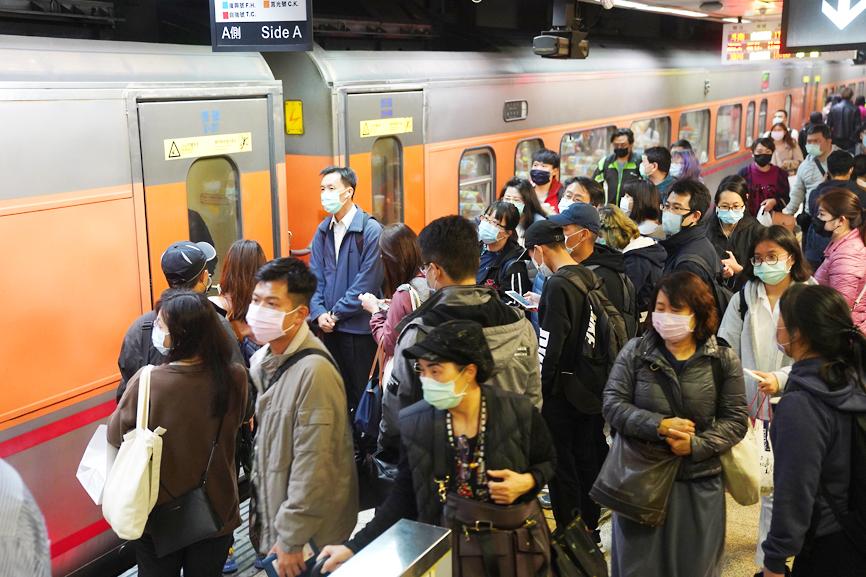The Ministry of Transportation and Communications (MOTC) yesterday faced criticism from members of the Legislative Yuan’s Transportation Committee for announcing on Tuesday that all train and freeway bus passengers would need to wear masks and have their temperatures taken before boarding as part of measures to prevent the spread of COVID-19.
While most commuters adapted to the new measures when they went into effect yesterday, many who were not aware of the changes argued with train and bus station staff, and complained that being forced to wear masks and wait in long lines to have their temperature taken caused them to miss their train or bus.
Chinese Nationalist Party (KMT) Legislator Hung Meng-kai (洪孟楷) said that while he does not disagree with the policy, the ministry should not announce new measures and institute them the next day, adding that such an abrupt move would definitely draw public ire.

Photo: CNA
As the Ministry of Economic Affairs has announced that adjustments to its mask sales policy would not be implemented until Thursday next week, when people can begin purchasing nine masks every two weeks instead of the current three per week, the MOTC’s new policy could cause commuters using public transport to not have enough masks, he said.
Some local government officials have signaled trouble enforcing the measure and have chosen to disregard it, leaving the nation with two policies regarding mask use, he added.
Independent Legislator Chao Cheng-yu (趙正宇) said that Minister of Transportation and Communications Lin Chia-lung (林佳龍) should not consider his notification of lawmakers an announcement of the policy, adding that the ministry should host a news conference to explain the new measures to the public.
Democratic Progressive Party Legislator Lin Chun-hsien (林俊憲) asked what the ministry would do if train or bus passengers defy the rules and insist on traveling, as well as what people should do if they are denied access to public transportation.
It should consider expanding disease-prevention taxi and rental car services so that people still have ways to commute, he said.
As many small train stations lack infrared imagers, trains could still be delayed in peak hours because station staff must take passengers’ temperatures one at a time, he added.
Deputy Minister of Transportation and Communications Huang Yu-ling (黃玉霖) said that the policy is compulsory and that those who do not comply would be prohibited from boarding trains and intercity buses.
The MOTC has planned for the policy’s enforcement and conducted drills since the Taiwan Lantern Festival in February, he said.
The policy applies only to Taiwan Railways Administration and Taiwan High Speed Rail Corp trains and freeway buses, Huang said, adding that whether MRT metropolitan rail networks enforce the measures depends on local governments.
Lin Chia-lung on Tuesday said that the policy would also apply to agencies supervised by the ministry, including 1,298 Chunghwa Post Co post offices and freeway rest areas.
The MOTC yesterday held a meeting to evaluate the implementation of the policy.
Apart from addressing the issues of passengers not wearing masks and long waits for temperature checks, it also required post offices, freeway rest areas and airports to enforce “social distancing” ordered by the Central Epidemic Command Center, by placing signs on floors indicating safe distances in areas where people have to line up for service.

South Korean K-pop girl group Blackpink are to make Kaohsiung the first stop on their Asia tour when they perform at Kaohsiung National Stadium on Oct. 18 and 19, the event organizer said yesterday. The upcoming performances will also make Blackpink the first girl group ever to perform twice at the stadium. It will be the group’s third visit to Taiwan to stage a concert. The last time Blackpink held a concert in the city was in March 2023. Their first concert in Taiwan was on March 3, 2019, at NTSU Arena (Linkou Arena). The group’s 2022-2023 “Born Pink” tour set a

The Taiwan High Court yesterday upheld a lower court’s decision that ruled in favor of former president Tsai Ing-wen (蔡英文) regarding the legitimacy of her doctoral degree. The issue surrounding Tsai’s academic credentials was raised by former political talk show host Dennis Peng (彭文正) in a Facebook post in June 2019, when Tsai was seeking re-election. Peng has repeatedly accused Tsai of never completing her doctoral dissertation to get a doctoral degree in law from the London School of Economics and Political Science (LSE) in 1984. He subsequently filed a declaratory action charging that

The Hualien Branch of the High Court today sentenced the main suspect in the 2021 fatal derailment of the Taroko Express to 12 years and six months in jail in the second trial of the suspect for his role in Taiwan’s deadliest train crash. Lee Yi-hsiang (李義祥), the driver of a crane truck that fell onto the tracks and which the the Taiwan Railways Administration's (TRA) train crashed into in an accident that killed 49 people and injured 200, was sentenced to seven years and 10 months in the first trial by the Hualien District Court in 2022. Hoa Van Hao, a

The Sports Administration yesterday demanded an apology from the national table tennis association for barring 17-year-old Yeh Yi-tian (葉伊恬) from competing in the upcoming World Table Tennis (WTT) United States Smash tournament in Las Vegas this July. The sports agency said in a statement that the Chinese Taipei Table Tennis Association (CTTTA) must explain to the public why it withdrew Yeh from the WTT tournament in Las Vegas. The sports agency said it contacted the association to express its disapproval of the decision-making process after receiving a complaint from Yeh’s coach, Chuang